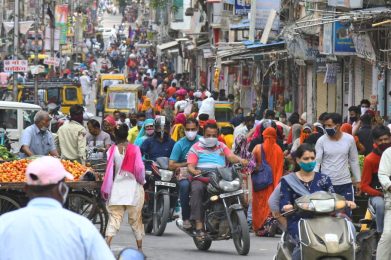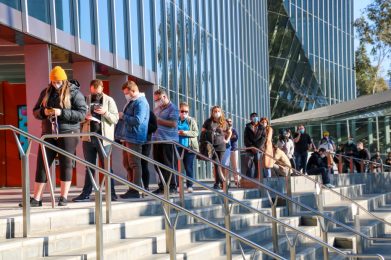Religion, Health, and Wellbeing
Healing, the overarching theme for the 2021 G20 Interfaith Forum, embodies an urgent yearning, worldwide, for health, wellbeing, and reconciliation. All three represent, in essential and interconnected ways, the missions and mandates of religious and interreligious bodies. Thus the Forum will continue and expand its focus on the pivotal Sustainable Development Goal centered on Universal Health Coverage and on the immediate challenges of addressing the COVID-19 pandemic and the “pandemics within pandemics” of mental health and fragility. These priorities are interlinked with concerns to address embedded patterns of racism and to ensure a priority focus on women and children.
With the COVID-19 pandemic still raging, religious and non-religious actors are working, often in new partnerships, to control the pandemic and then to ensure that appropriate lessons are learned to prepare for future events. The significant religious roles in both transmission and control of the virus link religious actors to public health controls and to broader social, economic, and political responses. Religious roles fall under different headings that include advocacy (WHO and CDC, for example, have worked with religious bodies on appropriate COVID-linked messages) and resistance to public health measures (legal suits contesting restrictions on gatherings, for example), social protection responses focused on vulnerable communities, and peacebuilding approaches to conflicts associated with the COVID emergencies (scapegoating of specific communities blamed for transmission). For a detailed overview of resources relevant to faith and COVID-19, see http://bit.ly/faith-and-COVID-19, Current areas of focus include engagement on vaccination campaigns (highlighting equity considerations and direct support in addressing distrust and misinformation) and the macroeconomic consequences of the crisis, where religious actors, notably the Catholic Church, are leading advocates for debt relief and restructuring and mobilization of finance for poorer countries.
The G20 leaders and diverse engagement groups are focusing sharply on the global dimensions of the pandemic, notably vaccine equity and effective rollout. The G20 Forum along with its partners (Berkley Center, WFDD, Joint Learning Initiative, Faith4Vaccines, CCIH) are actively involved in following and supporting the work of diverse faith-inspired networks involved in health delivery and other aspects of pandemic response. Recommendations to the G20 Summit, building on the 2020 policy brief and recommendations, will focus both on immediate priorities to ensure a sharp focus on vulnerable communities and on highlighting emerging lessons looking ahead to future epidemics.
The G20 Interfaith Forum also focuses on religious roles in health systems, which vary widely by region and country. The context is the goal of quality health for all, with a strong focus on community level approaches. In dialogue and partnerships between religious and non-religious actors, health is frequently the first and most significant entry point. The roles—positive and less positive—of religious factors in recent epidemics have highlighted their importance and still more prompted development of significant partnerships that include specific initiatives within UNAIDS, the Global Fund to Fight AIDS, Malaria, and Tuberculosis, and PEPFAR. The 2014-5 Ebola pandemic and the continuing HIV/AIDS challenges have both highlighted the risks of ignoring religious factors and benefits of proactive engagement. In a first, the respected Lancet published a series in 2015 focused on health that distilled evidence from research including magnitude of roles, quality, and controversies (on reproductive health and end of life, for example). A USAID/USIP Evidence Summit on Strategic Religious Engagement in October, 2020 drew on a substantial body of research on public health and religion, covering topics ranging from history and economics to areas of special concern such as pandemic preparedness, approaches to disability, and mental health.
The G20 Interfaith Forum will review these and other ongoing initiatives (for a detailed and develop specific recommendations to the G20 leaders aimed at reinforcing the health sector reforms in the direction of focus on vulnerable communities. Where religious health care is a substantial part of the system, an issue is to ensure the appropriate voices are at the table in strategic discussions and accounting for progress. Elsewhere, where religiously run facilities are quite limited and behavioral issues (diet and cleanliness practices, for example) involve religious and cultural elements, that needs to be taken into account.
Working Group Areas
- Religious Responses to COVID-19





